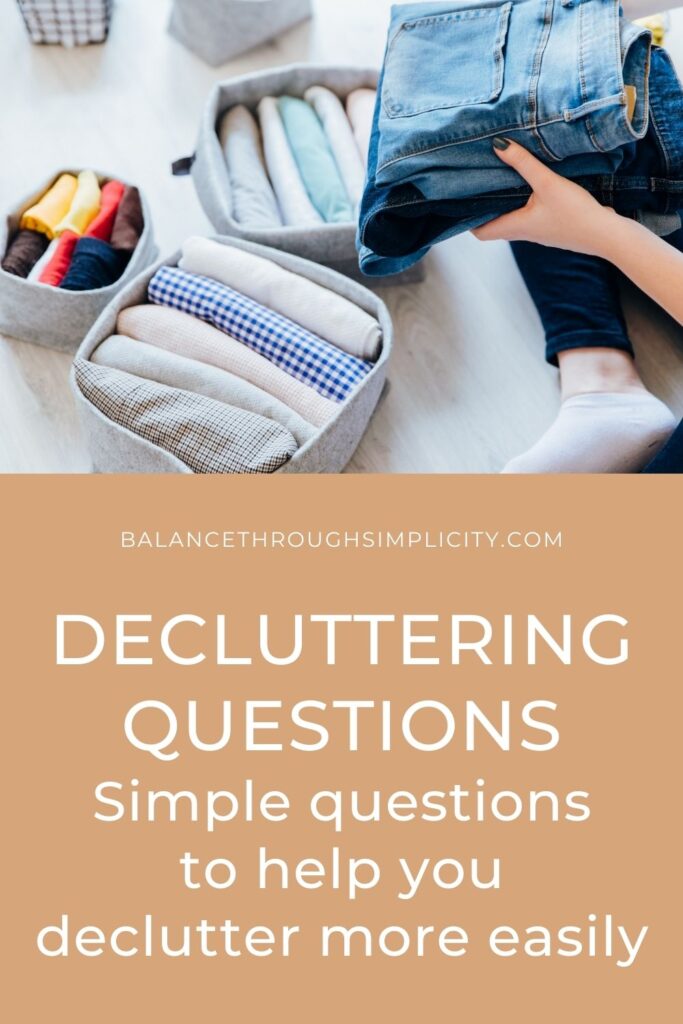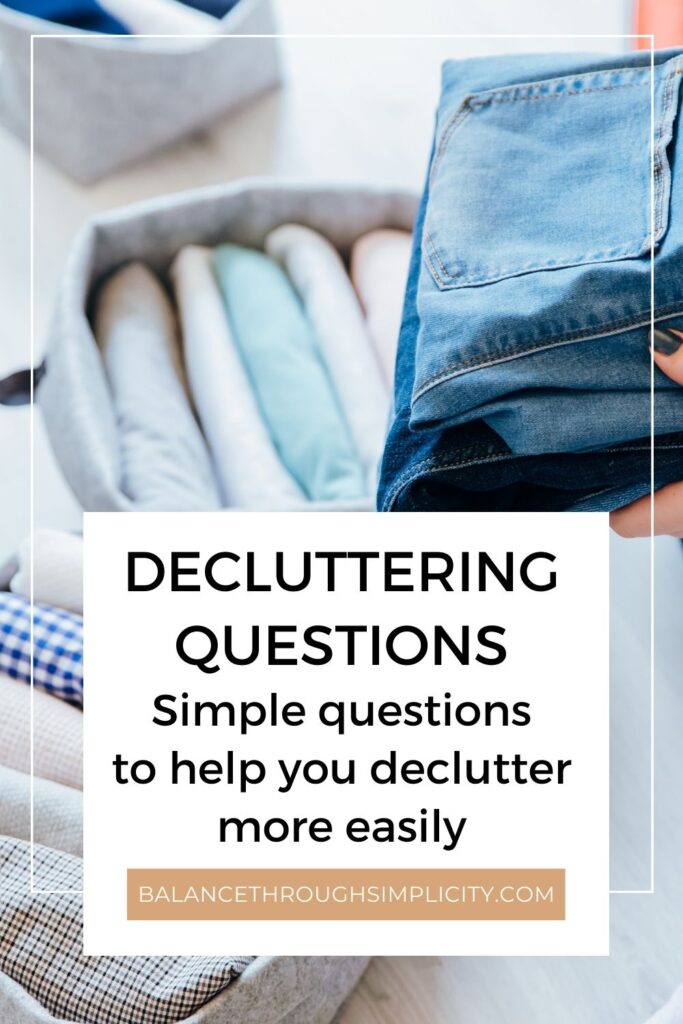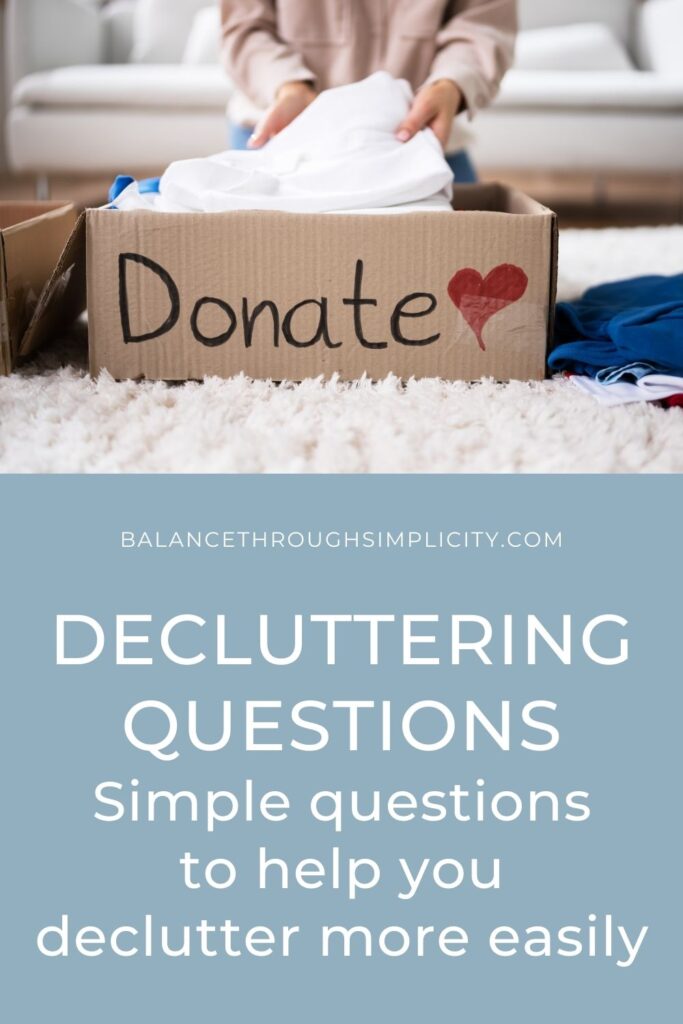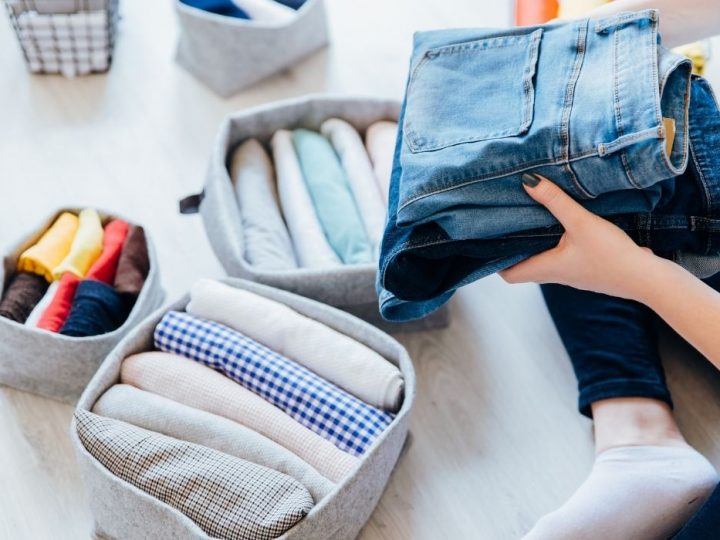DECLUTTERING QUESTIONS: QUESTIONS TO HELP YOU DECLUTTER MORE EFFECTIVELY
In this article I’m sharing some decluttering questions to ask yourself to help you decide whether or not to declutter an item. Practice decluttering and gain confidence to declutter more effectively.
WHY DECLUTTERING IS HARD
Decluttering is hard. We get anxiety from decluttering and worry about making the wrong decluttering decisions, where to start or how to declutter perfectly when we don’t have time, energy or support at home.
Maybe you’re worried that you’ll regret getting rid of things or that you’ll declutter too slowly to see or feel progress.
Perhaps you’re moving home or finding it difficult to look after your home now and you’d like to clear some stuff out to make it easier to manage and enjoy your home.
I understand that we struggle to declutter for a variety of reasons and, although there are many ways to make decluttering easier, at the end of the day, decluttering is about getting rid of things. And this can feel overwhelming and scary.
QUESTIONS TO HELP YOU DECLUTTER MORE EFFECTIVELY
One of the strategies that helped me the most when I was first beginning to declutter my own home was to ask myself questions about each item.
These decluttering questions made me really think about the item, when I last used it, the value it added to my life (not just in terms of monetary value) and whether I was holding on to it because it was useful or purposeful. Or instead, was I holding onto it for an emotional rather than practical reason or just because I was used to having that item around and I was keeping it through habit.
In this article I’m sharing some decluttering questions to help you declutter more effectively. Gradually, over time, you’ll probably find yourself asking these decluttering questions by second nature without really thinking about it. Decluttering gets easier with practice and as your confidence grows.
However, if you’re new to decluttering or struggle with knowing what to keep and what to get rid of, these decluttering questions might help!
DECLUTTERING QUESTIONS
Try considering these decluttering questions next time you go to declutter an item and get stuck. I hope they’ll help you simplify and declutter your own home with more ease and effectiveness and a lot less stress and frustration!
1. Do you need this item?
Is the item useful? Do you use it often? Do you rely on it being around? Do you look for it if you can’t find it? Does it serve a purpose and do you use it often enough to justify keeping it? If it’s a high value item that you use, but not very often, and would be expensive to replace, then keep it. If the item’s not useful, doesn’t serve a purpose or you can easily buy, borrow or rent a replacement, then let it go.
Think carefully about how many items you keep back ‘just in case’ and work out whether you have enough of those ‘just in case’ moments to justify having to look after the item for the rest of the time.
If you did get rid of this item but later found you needed it, what’s the very worst that could happen? How would you overcome this?
2. Do you love this item?
Maybe it’s something you love to look at, or it reminds you of something that you love to do, a place you love to be or someone you used to love. Or it could be something that you love to use or to wear.
If you LOVE it, then keep it. Liking something isn’t good enough when you have plenty of things you like and need to weed out the important from the unimportant. To use this question as a filter for your clutter, you really have to LOVE the item!
3. Do you want it?
This question is about whether the item adds value to your life, or you appreciate it enough to make space for it in your home or your life. It might not be something that you love, or you need, but it’s something that you really, really WANT in your life.
Ask yourself whether your life is enhanced by having this item in your life and would your life be any less if this item wasn’t in it? If you really WANT it, then keep it. Just be mindful that you can’t want everything!
Decluttering has many benefits but there are also trade-offs. We can’t keep everything and still have a clutter-free home so what’s more important to you right now? Do you want that item enough to sacrifice a little bit less space and a little more stuff to look after?
If you find yourself with this dilemma then sort out your WANT pile in any category and prioritise it. Keep the three most important things and let the rest go. You don’t WANT them badly enough or you’d have put them at the top of the list!
4. How often do you use it?
We’ve looked already at whether you need the item, but ask yourself how often do you use it? You might need it but do you actually only use it once every year or two? If this is the case, do you really need to look after and store it the rest of the time?
Everything you have in your home requires you to manage it and this costs money, space, time and energy. If you use the item regularly, every day or week, then it’s probably worth keeping. If it’s used less frequently, do you really need it?
An exception to this would be seasonal items, for example, or high value items. We have a top box we put on our car to hold our luggage, usually for our summer holidays. Although we don’t use it often, it would be expensive to replace so we store it in the garage until we need it.

5. Does it have an expiry date?
This doesn’t just apply to food but also things like medicines, credit and debit cards and make-up. Check the dates, throw out anything that’s past its best or has expired and only replenish what you’re going to need and use.
Helpful Tip: Decluttering items with an expiry date is actually a great place to start if you’re new to decluttering or you’re finding it overwhelming (or even not sure where to start). Decluttering an item that has expired, such as medication or a credit or debit card, doesn’t have the same emotional burden as decluttering Aunt Betty’s jewellery so you can be much more matter-of-fact about getting rid of it. The decluttering decision has a practical rather than emotional basis.
6. Can you borrow, loan or rent it?
When my kids were younger, we did some camping every now and then. However, I didn’t want the camping equipment taking up space in our small home so we borrowed the gear when we needed it. Can you do the same for items that you don’t use often so that they’re not lying around cluttering up your home for the rest of the year?
Another example could be books. Instead of keeping lots of books on your bookshelves, can you make more use of your local library and borrow books when you want to read them? These days you can also listen to audiobooks (I like Audible and Blinkist) and get the Kindle versions so they don’t take up physical space in your home.
7. Would you buy it now?
Always a good litmus test for whether it’s important and will add value to your life in some way. If you didn’t have the item already, would you buy it again or would you be unsure? If you’re unsure then it’s likely that you don’t use, need, want or love it as much as you could!
8. Was it a gift?
Some of the things we have in our homes aren’t bought by us or of our choosing. Just because someone bought you something doesn’t mean you have to keep it. Accept it graciously, say thank you, take a photo and then donate it to someone else who could benefit from it more.
Further reading: Try these tips on accepting gifts whilst staying clutter-free.

9. Does it make you feel guilty to part with it?
This doesn’t just apply to gifts. For example, you might have spent a month’s salary on a new handbag so, even though you don’t use it very much (or even like it much now), you feel guilty for getting rid of it because the bag cost so much to buy in the first place. Or, you might have decided to take up sewing, bought all the equipment and materials and then found it too difficult or time-consuming.
There’s no guilt in back-tracking on a decision, you’re not a failure for giving something up that doesn’t work for you any more, and there’s no guilt in getting rid of something because it’s no longer serving or supporting you. Don’t worry about making mistakes or being perfect!
Further reading: How to declutter without feeling wasteful: Is decluttering a waste of money?
10. Is there a purpose in keeping it?
By this I mean warranties on products just in case they’re faulty, or tax documents that you need to keep for a certain number of years, or passports and other legal documents such as wills.
Much of our paperwork can be scanned and saved electronically but sometimes we need to keep the original, physical copies. Check how long you need to keep important documents for and then find ways to file/store/save them in a way that’s organised and easy to find what you need!
Further reading: How to declutter paperwork and stop feeling overwhelmed by paper clutter.
11. Can it be repurposed?
An example of this could be sentimental items such as old photos, or your child’s drawings or baby clothes. What about taking a photo of these and keeping that rather than the actual item?
Or, for example, I use one of my grandmother’s serving dishes as a fruit bowl. Not only am I reminded of her every time I reach for a piece of fruit, but it puts the dish to good use instead of sitting in storage in my garage.
Further reading: Here are some ideas on how to declutter sentimental items or make use of them in other ways.
12. Do you have duplicates?
How many clothes hangers do you need? Or mugs, plates, cutlery? Having more of an item than you really need just adds to the clutter so get rid of duplicates whenever possible.
13. Do you have something similar?
Sometimes we find we need to buy something because we haven’t got exactly what we need in our homes already. A bag to go with our new dress, a pretty storage container to keep those herbs and spices under control in the kitchen cupboard, a drawer divider to separate out our underwear. But, perhaps you have something similar you could use instead of shopping for new? Improvise with containers, use slats of wood as drawer dividers, a different bag that’s the same shape and size but a different colour.
14. Can you do without it?
Always a good test for whether an item is just clutter. Can you make do without the item and still not make your life difficult or stressful? Sometimes we want something because we have it in mind to want it and that we can’t live without it. But, try not using something for a while and see if you can actually do without it.
I had plenty of examples of this kind of item in my kitchen utensil drawers. My husband loves utensils but really we only use a few basic items whenever we’re cooking. We could easily do without fancy utensils and gadgets that we succumbed to buying in the shops so we’ve since donated many of them!
15. Are you happy with the messages that item sends out?
A funny little question but a powerful one. Our stuff sends out messages.
- A book sitting on your bedside table waiting for you to read it but reminding you that you never have time to do that.
- A pair of jeans hanging in your wardrobe making you feel bad because you haven’t lost that weight you’ve been meaning to.
- The expensive sewing machine you bought when you thought you were going to take up sewing but that you never use because you’ve since discovered you don’t really like sewing.
Some of these messages you might be happy to hear. I have a bunch of flowers on my kitchen counter that remind me to water them, but I love how they make my kitchen look pretty and colourful. Other messages you may find frustrating and upsetting.
One decluttering question you could ask yourself then is whether the item in your hand is sending out positive or negative messages. Do you like what that item is saying to you. If yes, keep it. If not, maybe it’s time to get rid of it?
Further reading: Is your Silent To Do List stealing your time and energy?
16. Does it fit your current lifestyle?
Life changes and we change. Stuff that once supported us may now be holding us back, taking up space or getting in our way. Your home is for living in right now. If your stuff doesn’t fit your current lifestyle, it’s ok to let it go and pass it on to someone else who can put the item to good use and get greater benefit from that item than you.
“Decluttering is infinitely easier when you think of it as deciding what to keep, rather than deciding what to throw away.”
Francine Jay

DECLUTTERING QUESTIONS
It’s common to struggle with decluttering our stuff but armed with these questions, I hope you’ll grow in confidence and with practice as you move around your home.
The questions should make the process easier and less frustrating if you answer the questions honestly and objectively.
After all, sometimes we hang on to things just because we’ve always had them. Perhaps these questions will help you look at your stuff and what it contributes to your home and your life in a different way!
MORE RESOURCES ON DECLUTTERING
Here are some more articles and resources to help you declutter more effectively.
- How to Declutter Your Home and Life – Clearing clutter is often the first step to creating a simpler life, with more time, more ease and less stress. Decluttering isn’t always easy but this guide provides some helpful tips on how to declutter your home and life and make space for what matters most to you.
- Decluttering Regret: 12 Ways to Declutter Without Regret or Fear – How many times have you decluttered something but later regret your decision to get rid of it? Maybe the fear of decluttering regret is holding you back from successfully clearing your clutter? Here are some tips to avoid decluttering regret and how to declutter your home without the fear of regret but with more confidence and ease instead.
- How to Declutter When Your Spouse Doesn’t Want To – Deciding for yourself to clear clutter in your home and life is one thing but what happens when others in your home aren’t as keen. In this article I’m sharing some helpful tips on how to declutter when your spouse doesn’t want to.
- Decluttering Regret: 12 Ways to Declutter Without Regret or Fear – How many times have you decluttered something but later regret your decision to get rid of it? Maybe the fear of decluttering regret is holding you back from successfully clearing your clutter? Here are some tips to avoid decluttering regret and how to declutter your home without the fear of regret but with more confidence and ease instead.
SHARE YOUR THOUGHTS
Do you have any other decluttering tips to share! What questions do you find most helpful? What items or rooms do you struggle most with when it comes to decluttering and simplifying? Leave a comment below and share you thoughts! I’d love to hear from you!
A FREE DECLUTTER LIST
If you’re reading this article because you’re finding it difficult to declutter then I have something which might help you!
Following a decluttering list is a great way of clearing your clutter without getting too caught up in our thoughts and emotions. It’s easier to just follow the structure of a list, tick off items as you declutter them and use the list to chart your progress and see how well you’re doing.
A decluttering list stops us overthinking what to keep and what to get rid of. Instead, we’re doing as the list suggests and moving through our home item-by-item.
To get your free Declutter List, pop your details in the box below to receive your copy straight into your inbox.
DON’T MISS OUT!
I’m Antonia and on this blog I share practical inspiration to simplify your home, time and life. Follow me on Instagram, Facebook and Pinterest! You can also subscribe to Balance Through Simplicity and receive regular simplicity tips straight to your inbox for free. Make sure you never miss an article plus you’ll get a copy of my free Declutter Starter Kit as a welcome gift!


Laura
Sunday 20th of August 2023
Question 15 really resonated with me. I have a beautiful little teapot / teacup / saucer set given to me by a friend. I've had it for many years. However, the friend and I had an irrevocable falling out, and every time I look at it I get that subtle reminder that we're no longer friends. The sad thing is, it's very much my style, and I haven't seen anything like it in years. And yet I don't use it, because of its underlying message. As lovely as it is, it needs to go delight someone else, I think.
Balance Through Simplicity
Monday 21st of August 2023
Hi Laura, thank you for your comment. And this is why decluttering can be tough. We're not just dealing with our stuff, but our emotions too which seldom fit into neat little donation bags and boxes! I think that's why I love the concept of the 'messages' our stuff sends out. They often speak wiser words than following a checklist which we tick off but without doing the mindset work that will keep that clutter away. Asking different decluttering questions helps us approach decluttering from different angles, depending on our situation. Thank you for sharing your thoughts.
Kat
Monday 30th of January 2023
Very helpful, thank you! I have been at this a long time and sometimes get stuck. The questions are helping me get "unstuck."
Balance Through Simplicity
Tuesday 31st of January 2023
Hi Kat, I'm glad you're finding the tips helpful. Thanks for reading!